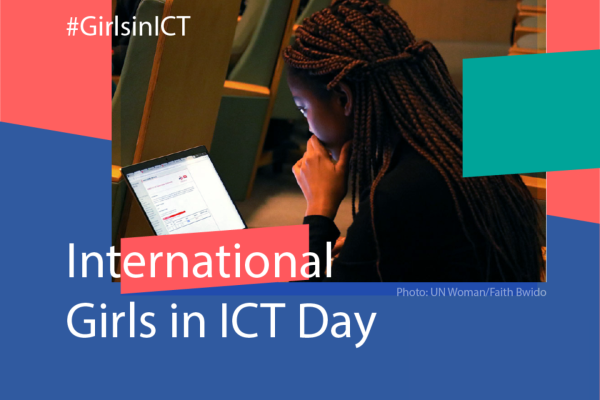On International Girls in ICT, CHARM-EU raises awareness and draws attention to the critical need for more girls and women in the ICT sector.

“Technologies are the best and most effective tools for making change” (Nino Nanitashvili, 2019)
Nino was 18 when she became the only girl in Georgia involved in a Google developer group. She went on to found Women Techmakers, which encourages women to explore new roles in IT. (UN Women, 2019).
Women’s key role was witnessed earlier in history too, as Augusta Ada King wrote the first computer program and became the first programmer. The importance of these historical moments shows women’s key role when technological innovations are growing. It is essential to acknowledge stereotypes, raise awareness about the importance of girls’ and women’s participation in STEM, and recognise how far women have come in education, specifically in the STEM field and business, and how many barriers persist. After this, many events happened where women took place in technological advancement.
Thematic Focus in 2023 – Digital Skills for Life
Digital Skills for Life is key in our societies and economy in the 21st century. For girls and young women to thrive in science, technology, engineering, and mathematics (STEM) careers, they must acquire skills to become ICT users and creators in the digital world. Empowering girls and women to pursue a future in ICTs and providing access and participation in education to acquire the necessary skills, confidence, and support to achieve their goals is essential.
CHARM-EU’s commitment to working towards inclusive education, science and just societies.
CHARM-EU joins to raise awareness of this International Day, reiterating our commitment to celebrate and reflect on efforts to tackle gender inequality, specifically in ICT and education. The jobs of the future will be driven by technology and innovation. Technology plays a role in all kinds of careers and disciplines and is one of the key tools for making change in the twenty-first century. Providing access to education is key to supporting all individuals, especially girls and women, to learn tech skills at a young age will set girls up for economic independence. By encouraging women to study and find jobs in ICT sectors, we are taking a big step towards helping the future generation, as their innovations will later benefit education, healthcare and the general employment market. Let’s collectively support and spread the importance of our girls in ICT. Acknowledging and tackling structural barriers, reducing exclusion, and working towards joint efforts empowering women and girls seeking global human rights-based and intersectional solutions are important. In alignment with our vision and mission and part of our work on inclusion and diversity to create an innovative university model that identifies and reflects on social challenges and seeks local and global solutions with the cooperation of the wider community. We acknowledge that structural barriers, including stigma and discrimination, remain a huge obstacle to social inclusion. Joint efforts of the CHARM-EU community and actors will foster the creation of a more just, inclusive education and society. We are committed to shaping minds and developing structures to realise the UN SDG’s values meaningfully.
Share who your favourite women in technology are and raise awareness by using the hashtag #GirlsinICT on social media. Find more information by visiting the following link: International #GirlsinICT Day (itu.int)
References:
ITU – International Telecommunication Union (ITU). International #GirlsinICT Day (itu.int)
UN Women International Girls in ICT Day: International Girls in ICT Day | UN Women – Headquarters
From where I stand: “Technologies are the best and most effective tools for making change” | UN Women – Headquarters
Credit:
This contribution was prepared in collaboration with Henrietta Ágnes Sudár, a student volunteer (ELTE BGGYK) & colleagues from the CHARM-EU Diversity, Equity, and Inclusion Team.